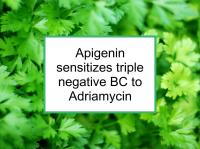Apigenin is a plant pigment compound found in parsley and a variety of other leafy plant foods. Population studies have reported that consumption of apigenin-rich foods is associated with reduced risk of breast cancer. Apigenin has also been shown to induce programmed cell death in a variety of breast cancer cells.
These include hormone receptor positive (ER+/PR+), HER2 overexpressing (HER2+), and triple negative (ER-/PR-/HER2-) cell lines. In addition, apigenin has been shown to increase the effectiveness doxorubicin, cisplatin, 5-FU (5-fluorouracil) and paclitaxel chemotherapy by reducing cancer cell growth, increasing cell death, and reducing proliferation.
Apigenin has previously been shown to induce favorable epigenetic changes that serve to reduce proliferation and growth in triple negative breast cancer cells. Epigenetic changes are modifications in gene expression caused by heritable, but potentially reversible, modifications in gene expression such as changes in DNA methylation and microRNAs. Now a new study has explained how apigenin sensitizes triple negative breast cancer to doxorubicin, thereby increasing treatment-induced programmed cell death.
Food sources of apigenin
Parsley, whether fresh or dried, is an excellent dietary source of apigenin. Artichokes, celery (especially celery leaves and green celery hearts), guava berries, garlic, bell peppers, and Chinese cabbage are also good sources. Apigenin is also found in mint and chamomile. Sage is another dietary source of apigenin, but it is on our list of foods to avoid, primarily because sage has been used in traditional medical to influence the reproductive system (including lactation) and it is not clear whether it promotes or inhibits breast cancer growth.
Supplementation with apigenin is not recommended
Apigenin is a phytoestrogen whose interactions with breast cancer are not well understood. Apigenin can act both as an estrogen and as an anti-estrogen depending on the dosage, and can actually stimulate the growth of estrogen receptor positive (ER+) breast cancer cells in some cases. Apigenin supplementation also has potential to reduce the effectiveness of treatment under some circumstances. For example, one study reported that apigenin reduced that effectiveness of both cisplatin and doxorubicin.
Safe and effective dosages of apigenin supplements have not been established. When apigenin is consumed as part of food, it is combined with other micronutrients that have been shown to act synergistically against breast cancer. Consuming apigenin-rich foods is safe and can potentially reduce breast cancer risk, increase the effectiveness of chemotherapy and radiotherapy, and reduce recurrence.
Latest research shows how apigenin sensitizes TN to doxorubicin
The study referenced above was designed to investigate apigenin-induced apoptosis (programmed cell death) in triple negative breast cancer treated with doxorubicin. The development of resistance to doxorubicin after a period of time is an important obstacle to successful treatment of triple negative breast cancer. Apigenin and related flavones have been identified as potential sensitizers to chemotherapy, but their effect on three-dimensional spheroid models of breast cancer has not been investigated. Spheroid models use specialized culture technology to simulate the 3D structure of tumors in tissue. The goal is to replicate important attributes of solid tumors, including their structural organization and other features. The authors previously demonstrated that apigenin has an influence on heterogeneous ribonuclear protein A2/B1 (hnRNPA2), an RNA-binding protein. However, the role of hnRNPA2 in apigenin's ability to increase the cytotoxic treatment effect of chemotherapy has not been explored until now.
In the study, the authors first showed that, due to higher cellular uptake, apigenin induced apoptosis in triple negative breast cancer spheroids more effectively than did apigenin glycoside. Next, the authors demonstrated that apigenin reduced the growth of patient-derived triple negative organoids at a concentration possible to attain in vivo. Apigenin increased doxorubicin-induced DNA damage, triggering an intrinsic apoptotic pathway, thereby inducing cell death. In further experimentation, the authors showed that silencing hnRNPA2 reduced the sensitization of triple negative spheroids to doxorubicin. The authors conclude that the study findings provide new insights into the crucial role of hnRNPA2 in apigenin-induced sensitization of triple negative breast cancer to doxorubicin.
Please see the apigenin tag and our article on triple negative breast cancer diet for more information.
